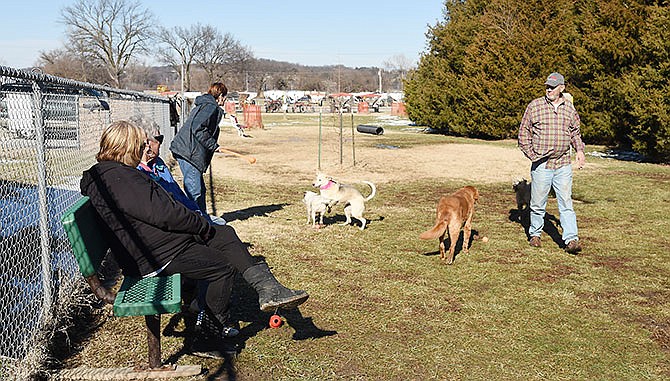After weeks of discussion and revisions, the Jefferson City Council has approved new changes to the city code concerning animals housed outside.
At the City Council meeting Monday, council members unanimously approved the latest version of the bill, which was pulled off the informal calendar and substituted one last time.
The bill, which was placed on the informal calendar Feb. 1, has been described by officials as accomplishing three things: allow the police to take the dog's breed, age, size and condition into consideration when determining the proper shelter; more clearly define what a suitable shelter entails; and allow for a dog in danger of a life-threatening health condition to be temporarily impounded.
"It's simply about life-threatening conditions for dogs and our ability to impound them," said 2nd Ward Councilman Rick Mihalevich, who also sponsored the bill. "I think saving a dog's life in extreme conditions is the humane thing to do."
The latest version of the bill takes out the section concerning specifications for a dog shelter, instead specifying only the following:
• "The structure shall be suitable for the breed, age, condition, size, and type of the dog; and
• The structure shall be moisture-resistant so it is not easily affected or harmed by water, wind-resistant, and of suitable size and type to allow the animal to stand, turn about freely, lie in a normal position, and regulate proper body temperature; and
• Suitable drainage shall be provided so that water will not unreasonably gather or pool and appropriate dry bedding shall be utilized inside the structure; and
• The dog must have space outside its shelter to move around and urinate and defecate away from its confinement, and this space must be free of broken glass and similar potentially dangerous materials which could result in injury to the dog; and
• Floors of shelter, runs and walls shall be of appropriate waterproof material to permit proper cleaning and disinfection."
The substitute also went into more detail on how and when the city would seize "an animal in danger," defining a life-threatening health condition as including instances where "the National Weather Service has issued a severe thunderstorm, tornado, heat advisory, cold advisory, or a winter storm warning for Cole County, Missouri and the animal is being held in violation of this section."
It also defines the process for seizure, stating the director must have probable cause "to believe an owner or person in charge of any animal is in violation" of the ordinance and the animal "is in danger of a life-threatening health condition" before the director or designee may impound and place the animal in the city animal shelter. Impounding the animal would only be allowed after "reasonable effort to notify the owner and allowing the owner the opportunity to correct the violation."
The ordinance specifies any animal impounded would be subject to normal shelter procedure in terms of costs.
Another change was the specification of a "post deprivation hearing," which states an owner whose animal has been seized may request a hearing before the director to review the decision to seize or the costs assessed. The request would have to be made within 10 days of the seizure and, after the hearing, the director must issue a decision within 20 days of the hearing date. That decision could then be appealed to the Circuit Court.
In other business, the council unanimously approved the solid waste contract with Allied Waste, selecting the company as the city's sole trash provider for the next 10 years.
In November 2009, the city entered into a six-year contract with Allied Waste for exclusive service to city residents. Though several companies had expressed an interest in bidding on the service, Allied was the only bid received by the city. An ordinance passed earlier that year made the service mandatory, and not subscribing to it is a violation of city code.
Late last year, the city made public the bids from Allied Waste and Waste Corporation of America on the city's trash service moving forward. Proposals from Allied and WCA contained rates lower than what residents, and many businesses, are currently paying. However, surprisingly, that lower rate did not come with much change in service. An evaluation committee made up three department directors had recommended the City Council proceed with the 10-year, exclusive contract with Allied Waste.
The new contract takes effect in June.

